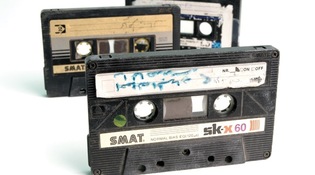 loading
loading
Arts & CultureObject lessonVoices from jihad Flagg Miller, assistant professor of religious studies at the University of California - Davis, helped bring the tapes to Yale. He is writing a book about them.  Mark MorossseSterling Memorial Library is the repository for a cache of more than 1,500 audiotapes discovered at Osama bin Laden's residence in Afghanistan. They will be restored, digitized, and made available to researchers within the next few years. View full imageThe tape begins with a sudden burst of static. Unidentifiable in tone, it continues evenly in a low drone, clinking now and then, occasionally shifting frequencies. Then there are voices in Arabic: Hawa, hawa, giib luh hawaa. . . . "Air, air, give it air. . . . Don't you notice that its voice is weak? It needs air . . . with force." The mysterious conversation is featured on one of more than 1,500 audiotapes from Osama bin Laden's personal residence in Afghanistan: CNN acquired them in December 2001, just weeks after the fall of the Taliban. The tapes are now at Sterling Memorial Library, being cleaned and digitized for researchers. No other equivalent "library" of bin Laden's has yet come to light. The handwritten labels on this tape read "With the Mujahideen" on Side A, and "Dawn Anthems" on Side B. Upon first hearing it, I was puzzled. Neither side features the rousing Islamic "anthems," about pious devotion or martyrdom, found on dozens of other cassettes. And what was it that needed air? A communications balloon? A blowgun of some sort? It turned out to be a kerosene stove. The soldiers are making breakfast. Over the next 60 minutes, speakers playfully compare cooking eggs to fighting jihad. Amid laughter, camaraderie, and speculations about when bin Laden and al Qaeda's founder will show up, the mujahideen's lives and aspirations take on a new aspect. The tapes offer invaluable insight into the living moments of al Qaeda's period of most coherent organizational momentum, between 1996 and 2001. Twenty tapes record bin Laden's recruitment speeches to audiences across the Arab world, some dating from the late 1980s. None of this material has been published before. Some tapes focus on bin Laden's personal combat experience with the Soviets, providing new insights into the visceral origins of his hatred for infidels. Others feature narratives about historical Muslim clashes with Jews and Christians; these shed light on the symbolic armature of bin Laden's arguments. In the collection are the voices of more than 200 preachers, jurisprudents, militants, and others whom bin Laden was listening to before 9/11. Many are extremists, others moderates who became sharp critics of his aims and methods. Some cassettes even offer glimpses of the cultural life behind the movement -- conversations, poetry recitations, studio-produced skits, and weddings at which bin Laden is a guest. On several tapes, bin Laden recites his own poems. The stunning array of material suggests that debate and disagreement were as central to al Qaeda's formation as was consensus. As digital versions become available to researchers, Yale will play host to urgent discussions about the development of the world's most notorious terrorist and the organization he has led.
The comment period has expired.
|
|